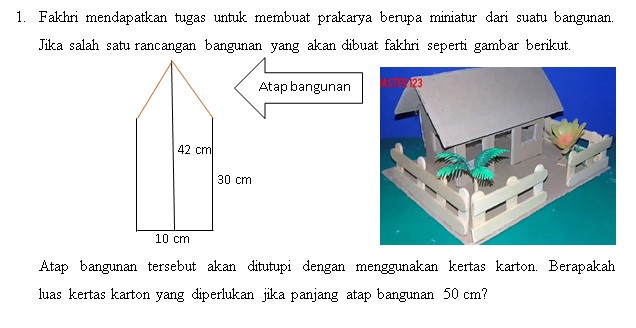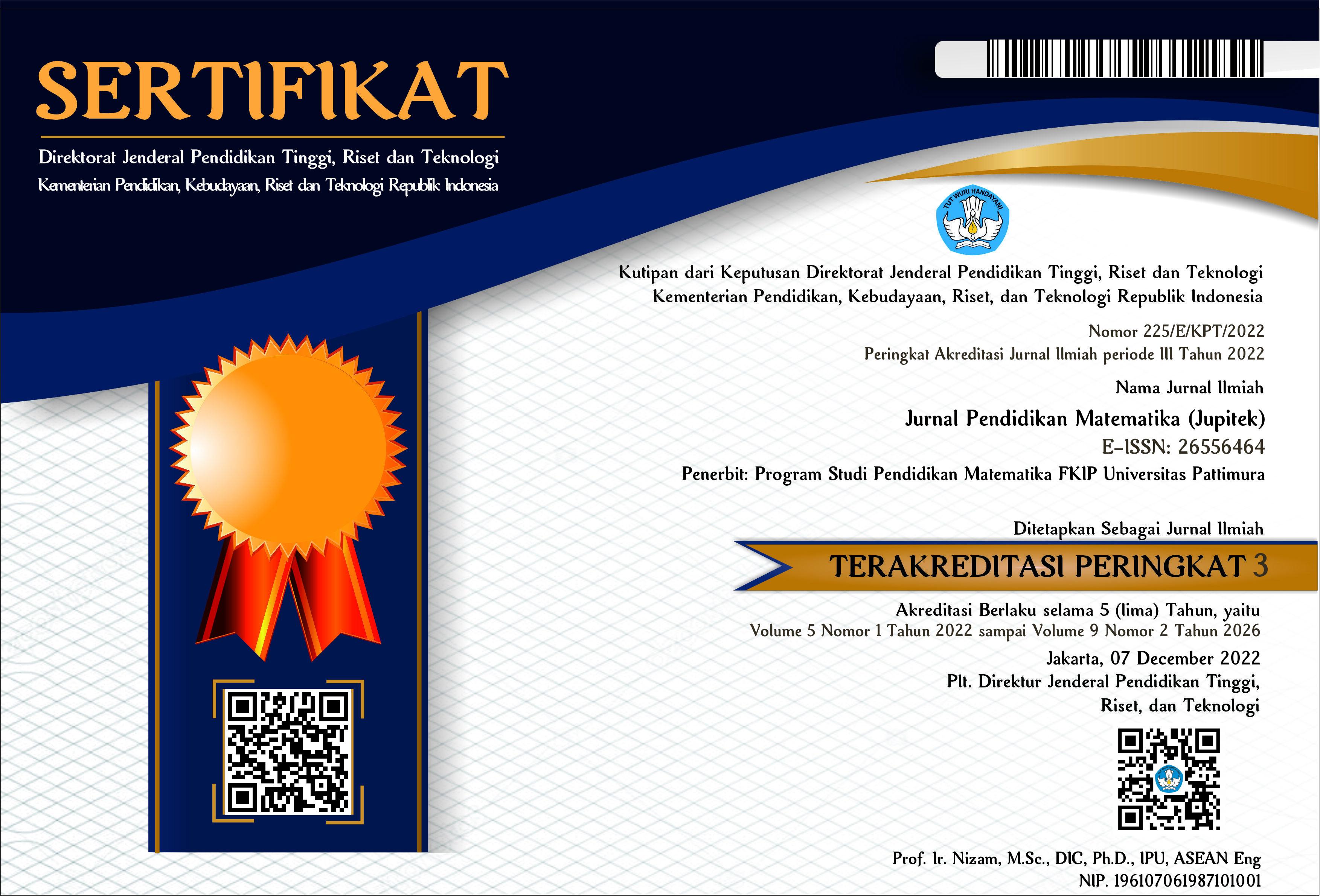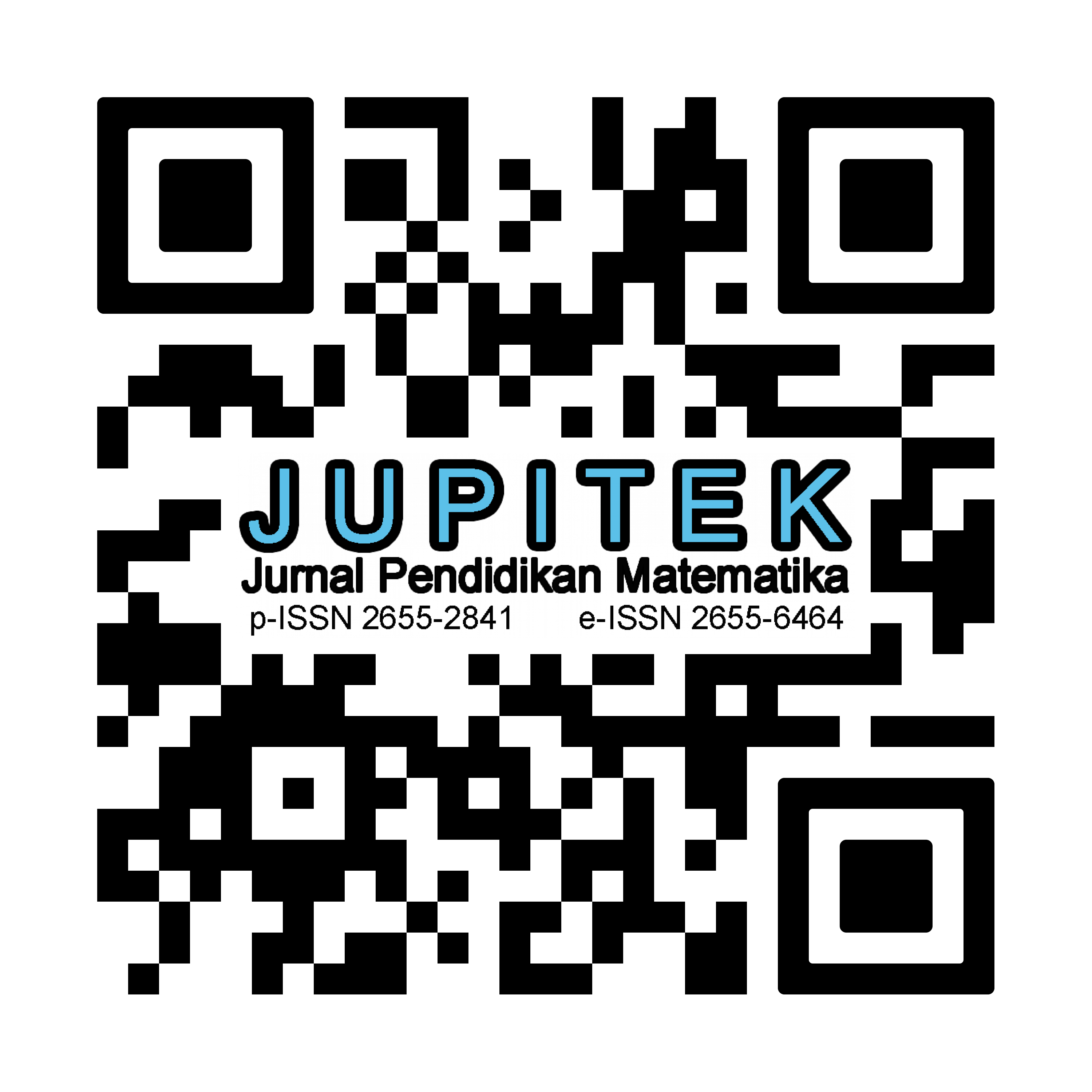THE EFFECT OF GIVING ILL-STRUCTURED MATH PROBLEM AND WELL-STRUCTURED MATH PROBLEM ON THE SELF-EFFICACY OF JUNIOR HIGH SCHOOL STUDENTS
Abstract
This study aimed to determine the effect of giving ill-structured problems and well-structured problems to students' self-efficacy. The study population was class VIII students at Junior High School 1 Ngawen Blora which consisted of an experimental class and a control class with the selection of samples using purposive sampling technique. This research is a quantitative research with a comparative problem formulation that compares the increase in self-efficacy between students who are given well-structured math problems and ill-structured math problems. The data analysis technique used was t-test dependent and t-test independent. The results showed that: 1) there is an effect of giving ill-structured math problems on students' self-efficacy at a significant level of 0.05; 2) there isn’t an effect of giving well-structured math problems on students' self-efficacy at a significant level of 0.05; 3) there is a difference in changes in student self-efficacy between giving ill-structured math problems and giving well-structured math problems at a significant level of 0.05
Downloads
References
Alifia, N. N., & Rakhmawati, I. A. (2018). Kajian kemampuan self-efficacy matematis siswa dalam pemecahan masalah. Jurnal Elektronik Pembelajaran Matematika, 05(1), 44–54. Retrieved from https://jurnal.uns.ac.id/jpm/article/view/26024/18242
Ayotola, A., & Adedeji, T. (2009). The relationship between mathematics self-efficacy and achievement in mathematics. Procedia - Social and Behavioral Sciences, 1(1), 953–957. https://doi.org/10.1016/j.sbspro.2009.01.169
Bandura, A. (2010). Self-efficacy and educational development. In Self-Efficacy in Changing Societies. United Kingdom: Cambridge University Press. https://doi.org/10.1017/cbo9780511527692.009
Cho, M. K., & Kim, M. K. (2020). Investigating elementary students’ problem solving and teacher scaffolding in solving an Ill-structured problem. International Journal of Education in Mathematics, Science and Technology, 8(4), 274–289. https://doi.org/10.46328/IJEMST.V8I4.1148
Goel, V. (1992). Comparison of Well-Structured & Ill-Structured Task Environments and Problem Spaces. Fourteenth Annual Conference of the Cognitive Science Society, (January 1992).
Hendriana, H., & Soemarmo, U. (2014). Penilaian Pembelajaran Matematika. Bandung: PT Refika Aditama.
Hong, J. Y., & Kim, M. K. (2016). Mathematical abstraction in the solving of ill-structured problems by elementary school students in Korea. Eurasia Journal of Mathematics, Science and Technology Education, 12(2), 267–281. https://doi.org/10.12973/eurasia.2016.1204a
Ibda, F. (2015). Perkembangan Kognitif: Teori Jean Piaget. Intelektualita, 3(1), 242904.
Kesumawati, N., Retta, A.M., & Sari, N. 2018. Pengantar Statistika Penelitian. Depok: Rajawali Pers.
Lunenburg, F. C. (Sam H. S. U. (2011). Self-Efficacy in the Workplace: Implications for Motivation and Performance. International Journal Of Management, Business, And Administration, 14(1), 552–557. https://doi.org/10.1177/216507999103901202
May, D. K. (2009). Mathematics Self-Efficacy and Anxiety Questionnaire. Universitas Georgia.
Putrawangsa, S., & Hasanah, U. (2022). Analisis Capaian Siswa Indonesia Pada PISA dan Urgensi Kurikulum Berorientasi Literasi dan Numerasi. Jurnal Studi Pendidikan Dan Pembelajaran, EDUPEDIKA, 1(1), 1–12.
Sahendra, A., Budiarto, M. T., & Fuad, Y. (2018). Students’ Representation in Mathematical Word Problem-Solving: Exploring Students’ Self-efficacy. Journal of Physics: Conference Series, 947(1), 0–5. https://doi.org/10.1088/1742-6596/947/1/012059
Siegle, D.: MCCoach, D. B. (2007). Increasing Student Mathematics Self-efficacy Through Teacher Training. Journal of Advance Academics, 18(2), 278–312.
Toy, S. (2007). Online ill -structured problem-solving strategies and their influence on problem-solving performance. ProQuest Dissertations and Theses, 120. Retrieved from https://search.proquest.com/docview/304858126?accountid=10673%0Ahttp://openurl.ac.uk/redirect/athens:edu/?url_ver=Z39.88-2004&rft_val_fmt=info:ofi/fmt:kev:mtx:dissertation&genre=dissertations+%26+theses&sid=ProQ:ProQuest+Dissertations+%26+Theses+Global&at
Ulandari, A. R. P., Hudiono, B., & Bistari, B. (2015). Kemampuan representasi matematis menyelesaikan soal open-ended menurut tingkat kemampuan dasar materi segiempat di smp. Jurnal Pendidikan Dan Pembelajaran Khatulistiwa, 04(6), 1–10.
Yee, F. P. (2002). Using Short Open-ended Mathematics Questions to Promote Thinking and Understanding. Proceedings of the 4 Th International Conference on The Humanistic Renaissance in Mathematics Education, Palermo, Italy., 135–140. Retrieved from http://math.unipa.it/~grim/SiFoong.PDF
Zimmerman, B. J. (2000). Self-Efficacy: An Essential Motive to Learn. Contemporary Educational Psychology, 25(1), 82–91. https://doi.org/10.1006/ceps.1999.1016

Copyright (c) 2022 Indri Aninda Rahmasari, Susanah Susanah

This work is licensed under a Creative Commons Attribution-NonCommercial-ShareAlike 4.0 International License.
License and Copyright Agreement
By submitting a manuscript to Jurnal Pendidikan Matematika (JUPITEK), the author(s) certify and agree to the following terms:
- Originality and Authority: The submitting author is authorized by all co-authors to enter into this agreement. The manuscript describes original work that has not been published previously in a peer-reviewed journal, nor is it under consideration for publication elsewhere.
- Approval: Its publication has been approved by all author(s) and by the responsible authorities of the institutions where the work was carried out.
- Rights: The authors secure the right to reproduce any material that has already been published or copyrighted elsewhere.
- Licensing and Copyright: Authors retain the copyright to their work.
- License Grant: The authors grant Jurnal Pendidikan Matematika (JUPITEK) the right of first publication, with the work simultaneously licensed under the Creative Commons Attribution-NonCommercial-ShareAlike 4.0 International (CC BY-NC-SA 4.0).
- Self-Archiving: Authors are permitted and encouraged to deposit the published version of their article in institutional repositories, on their personal websites, and other academic platforms, with proper acknowledgment of its initial publication in Jurnal Pendidikan Matematika (JUPITEK).





.png)


